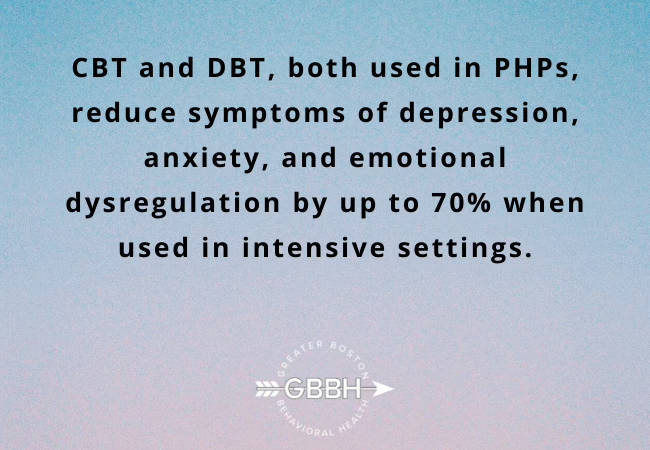When facing mental health challenges, choosing the right level of care is one of the most important decisions you can make. However, many people hesitate to seek the help they need because of misconceptions about treatment options—especially Partial Hospitalization Programs (PHPs).
Unfortunately, myths surrounding PHPs often prevent individuals from accessing effective care during times of crisis or instability. At Greater Boston Behavioral Health, we offer a highly structured, evidence-based Partial Hospitalization Program in Boston that bridges the gap between inpatient and outpatient services—providing intensive support without 24/7 hospitalization.
In this blog, we’ll debunk some of the most common myths about PHPs and share what you can really expect when you participate in a program designed to promote stability, healing, and long-term mental wellness.
What Is a Partial Hospitalization Program (PHP)?
Before we explore the myths, let’s clarify what PHP really is. A Partial Hospitalization Program is a short-term, structured mental health program where clients receive intensive treatment during the day and return home at night. Most PHPs operate five days per week, typically for 4–6 hours per day, and include:
- Individual and group therapy
- Cognitive Behavioral Therapy Boston (CBT)
- Dialectical Behavior Therapy in Boston (DBT)
- Anger Management Therapy in Boston
- Psychiatric care and medication management
- Skill-building workshops and psychoeducation
PHP is a key part of many people’s recovery journey, and a core offering within our Mental Health Programs in Boston.
Myth #1: PHP Is Basically the Same as Inpatient Treatment
Reality: While PHP provides intensive care, it does not require overnight stays or 24-hour supervision like an Inpatient Treatment Program in Boston.
Inpatient care is intended for individuals in acute crisis—such as those with suicidal ideation, psychosis, or immediate safety concerns. PHP, on the other hand, is best for people who need a higher level of structure and support than traditional outpatient therapy, but who are stable enough to live at home or in a supportive living environment.
PHP offers the benefits of intensive treatment without removing individuals from their everyday lives, making it a more flexible and empowering option for many.
Myth #2: PHP Is Only for People with Severe Mental Illness
Reality: PHP is used to treat a wide spectrum of mental health conditions, not just the most severe.
At Greater Boston Behavioral Health, we help clients in PHP who are managing:
- Depression or suicidal thoughts (without immediate danger)
- Panic attacks or debilitating anxiety
- Post-traumatic stress disorder (PTSD)
- Emotional dysregulation or anger issues
- Bipolar disorder (in maintenance phases)
- Co-occurring disorders (mental illness + substance use)
- Mood instability linked to trauma or personality disorders
Whether you’re stepping down from inpatient care or stepping up from outpatient therapy, PHP offers comprehensive treatment for individuals at many different stages of recovery.
Myth #3: I’ll Lose My Job or School Spot If I Enter a PHP
Reality: PHP can actually help you preserve your functioning—and protect your future.
While PHP typically runs during the day, many employers and schools offer accommodations for mental health treatment. Taking time to stabilize your health through a PHP can lead to:
- Improved concentration and performance
- Reduced absenteeism due to crisis episodes
- Healthier coping strategies and stress management
- Greater emotional resilience at work or school
At Greater Boston Behavioral Health, we support clients through workplace documentation, school coordination, and personalized aftercare planning, including step-down to our Intensive Outpatient Program in Boston (IOP).
Myth #4: PHP Doesn’t Offer Real Therapy—It’s Just Group Check-Ins
Reality: PHP provides multiple hours of real therapy every day.
Clients in our Partial Hospitalization Program in Boston engage in:
- Individual therapy (1–2 times per week)
- Group therapy sessions (daily)
- Skills-based workshops (CBT, DBT, anger management)
- Family therapy sessions when appropriate
- Psychiatric evaluations and medication monitoring
These services are delivered by licensed therapists, psychiatrists, and clinical staff who specialize in trauma, mood disorders, emotional regulation, and dual diagnosis care. Our Mental Therapy Programs in Boston are outcome-driven, person-centered, and rooted in the latest clinical best practices.
Myth #5: If I Start PHP, I’ll Be Trapped in Treatment Forever
Reality: PHP is designed to be short-term and transitional.
The goal of PHP is to:
- Stabilize acute symptoms
- Teach core emotional regulation and coping skills
- Reduce risk of relapse or hospitalization
- Help clients transition back to daily life
Most clients complete PHP in 2–6 weeks, depending on individual progress. From there, they may step down to IOP, return to outpatient therapy, or continue care with our Mental Health Treatment Center Boston.
We also offer:
- Residential Treatment Program in Boston for clients needing immersive care
- Aftercare planning and ongoing support to maintain progress
Myth #6: PHP Is Only for Adults
Reality: Many PHPs, including ours, serve adolescents and young adults as well.
Teenagers facing challenges like:
- Mood swings and depression
- Anxiety and panic attacks
- Self-harm or suicidal thoughts (without active intent)
- Trauma responses
- School refusal and social withdrawal
…can benefit from structured, therapeutic care that doesn’t interrupt their education long-term. Our youth PHP includes specialized programming, family involvement, and therapeutic activities tailored to developmental needs.
Who Is a Good Fit for PHP?
While there’s no one-size-fits-all answer, certain patterns help determine if a Partial Hospitalization Program is the right next step in someone’s recovery. At Greater Boston Behavioral Health, we often recommend PHP for individuals who:
-
Are transitioning from inpatient care and need a step-down level of support
-
Are struggling with depression, anxiety, trauma, or emotional dysregulation
-
Have tried weekly therapy but need more structured, intensive care
-
Need daily clinical oversight while maintaining life responsibilities
-
Experience relapse risk in mood, behavior, or substance use without support
-
Want help managing complex diagnoses such as dual diagnosis or borderline personality disorder
Our admissions and clinical team provides a thorough assessment to ensure that PHP is appropriate for your symptoms, environment, and goals—and will offer a different level of care if needed, such as an Intensive Outpatient Program in Boston or Residential Treatment Program in Boston.
What Happens After PHP?
Many people worry, “What comes next after PHP?” The good news is that Partial Hospitalization Programs are not the end—they’re a transition point. After successfully completing PHP, you and your treatment team will collaboratively build a plan that may include:
-
Step-down to IOP: Our Intensive Outpatient Program in Boston allows you to continue building skills with more scheduling flexibility (typically 3–5 days a week for 2–3 hours per day).
-
Ongoing outpatient therapy: Many clients continue seeing a therapist weekly for long-term support and progress monitoring.
-
Medication management: You may continue psychiatric care with providers at our Mental Health Treatment Center Boston or transition to a community psychiatrist.
-
Family therapy and support groups: Recovery doesn’t happen alone. Family counseling and support groups may continue to strengthen your home environment.
-
Alumni and aftercare planning: We connect you with aftercare resources, sober communities (if applicable), or peer recovery groups to prevent relapse and reinforce what you’ve learned.
Our goal is to ensure that your transition out of PHP is just as intentional, supported, and empowering as the work you do during it.
Why Choose Greater Boston Behavioral Health for PHP?
At Greater Boston Behavioral Health, our Partial Hospitalization Program is built around clinical excellence and compassionate care. Here’s why more individuals and families trust us with their healing journey:
- Personalized treatment plans for mood disorders, trauma, emotional dysregulation, and co-occurring disorders
- Licensed experts in CBT, DBT, anger management, and psychiatric care
- Seamless access to higher or lower levels of care, including inpatient, IOP, and residential treatment
- Safe, inclusive environment that fosters growth and connection
- Daily support that balances structure with flexibility
Whether you’re navigating a mental health relapse or looking to prevent one, our PHP gives you the tools and support you need—without sacrificing your autonomy.
Conclusion
Partial Hospitalization Programs are often misunderstood, but in reality, they are one of the most effective, accessible, and empowering options for individuals who need intensive care without full hospitalization.
At Greater Boston Behavioral Health, our PHP combines structure, therapy, and expert psychiatric support to help you stabilize and thrive. Whether you’re facing depression, trauma, anxiety, or emotional overwhelm, we’re here to walk with you—every step of the way. Call (888) 278-0716 to learn more about how our PHP can help you move forward with strength and support.
FAQ on Common PHP Myths—Clarified
Is PHP just like being in a hospital?
No. PHP offers structured mental health treatment during the day but allows you to return home at night. It is less restrictive than inpatient care and ideal for moderate-to-severe symptoms.
Do I have to be “really sick” to qualify for PHP?
Not at all. PHP supports individuals experiencing emotional distress, anxiety, depression, or trauma—even if they’re not in crisis. It also helps those stepping down from inpatient care.
Will I be forced to stay longer than I want?
No. PHP is voluntary and designed to be short-term. Most programs last 2–6 weeks depending on your goals and progress.
Can I still work or go to school during PHP?
Possibly. While PHP takes place during the day, many clients arrange accommodations through school or work. After PHP, many transition to IOP to regain full schedule flexibility.
Does PHP really include therapy every day?
Yes. PHP includes daily group therapy, 1:1 sessions, medication management, and skills training using CBT, DBT, and more.


